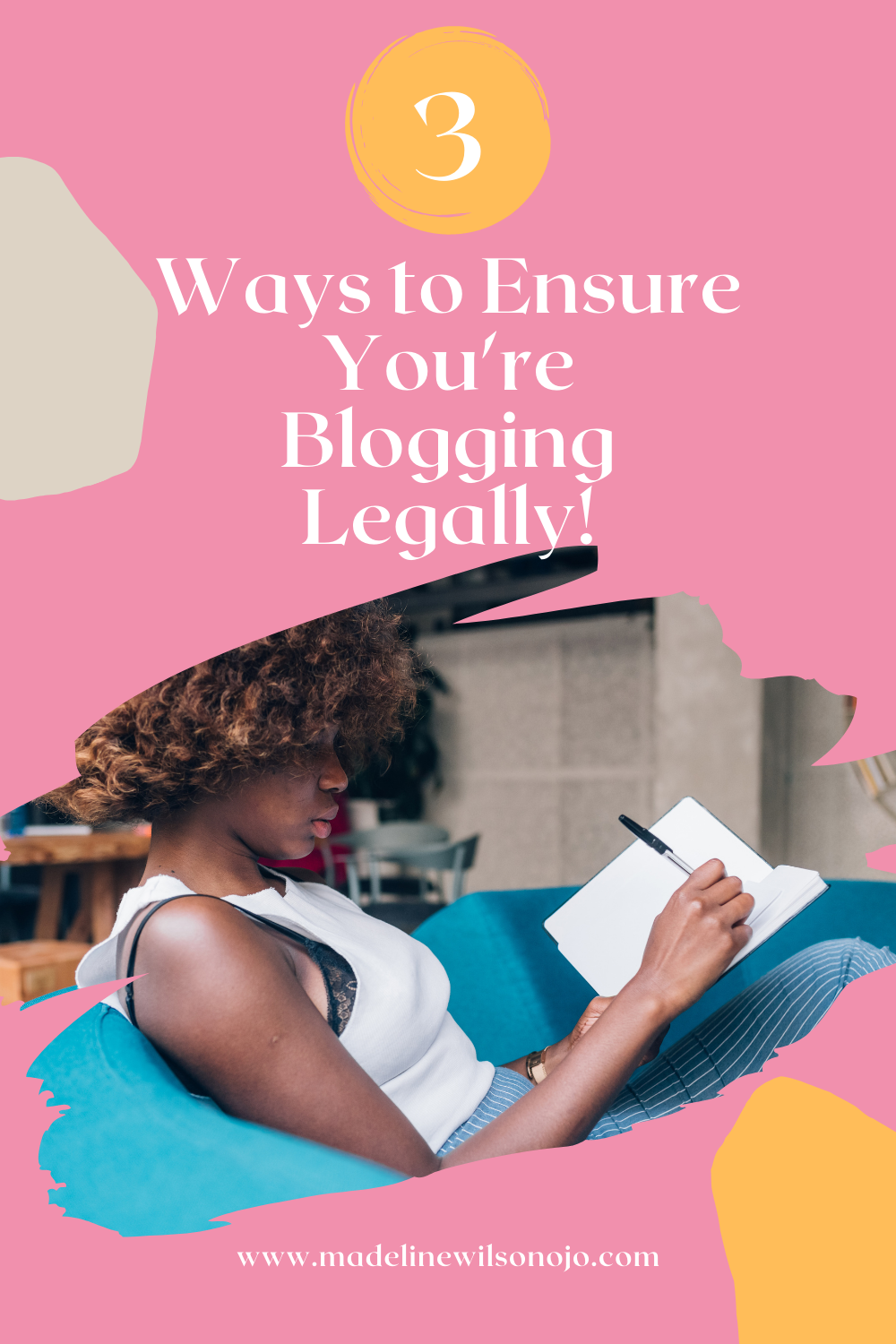Are you a blogger? If so, do you remember the energy that went into thinking of a blog name, selecting the right hosting platform, selecting a template? How about making sure the material you produce is legitimate and ethical?
Before we dive even further into today’s topic, let me warn you that we’ll be dissecting some real technical stuff!

For most of us, when we started our blogging, we did so in the comfort of our homes with the notion that nobody would be reading our writing. In a strange way, there’s a real sense of comfort in this because it helps ease the pressure of blogging, making it easy to produce content and even get carried away with what we share.
However, the public nature of online forums including your blog means that, far from being a private space where you can freely pour your out thoughts, your blog is officially published material. And as any published author knows, this accolade comes with a whole load of legal requirements.
With bloggers regularly getting hit with hefty fines and big-brand lawsuits, this is something that you need to consider sooner rather than later. After all, the last thing you need when you’re trying to get your blog off the ground is to see a much-dreaded threat to sue in your inbox. The legal fines alone could stop your blog in its tracks!
The question is, how exactly can you keep everything squeaky clean on your blog? How can you stop the legal minefield From blowing up your blog?
1 – Always research the media you’re using
The main reason bloggers face legal action is that they make the mistake of using media without the necessary permissions. This is a copyright infringement and if the offended party can prove your crime, the law is very much on their side.
View this post on Instagram
The trouble is that, without meaning to, countless bloggers trip up here. Music is perhaps the most problematic in this sense, but pictures also pose problems, especially with so-called royalty-free sites like Flickr confusing matters on what you can actually use. With this in mind, all bloggers need to remember a few key rules, such as –
- looking for the‘CC0 Licence’ tags on any pictures
- checking the small print
- seeking stock media from reputable sites
- never think you’ll get away with infringement.
The best thing you can do is to make sure that you’re always seeking stock media from one of the many sites that provide unquestionable, free-to-use options, such as:
- Pexels
- Pixabay
- Unsplash
- Videvo
- Distill
- Pond5
- Musicbed
- Artlist
2 – Understand geographical requirements
Since the introduction of the EU’s general data protection regulation (GDPR) back in 2018, location has become yet another pressing legal consideration that bloggers need to take into account. Most notably, data consent must now be offered in some way for users accessing your site from across Europe. Fail to take care of this, and you stand at risk of fines.
That’s terrible news, and it’s something you can avoid by ensuring compliance through:
- keeping detailed records of data processing operations
- ensuring editing permissions on reader information
- complying with express customer permission during data processing
- implementing appropriate data security measures
This may all sound pretty complicated, but there are now plenty of easy sites to help you create forms that you can implement onto your blog. If all else fails, seeking help from third-party providers may be a cost worth fronting to avoid the fines and reputational damage that GDPR breaches can incur.
Either way, you need to ensure that your GDPR forms are inclusive and easy to understand to avoid complication and potentially, legal issues. The main thing to do here is to get researching and don’t be afraid to take inspiration from some of the larger brands, as can be seen in these GDPR marketing content examples from Userzoom. It’s also vital to note that, despite your best efforts, GDPR evolves alongside online risks, so keeping on top of the latest threats and compliance changes is fundamental for future-proofing your legal standing.
3 – Keep your opinions based on fact
As content creators, we’re natural storytellers. We just love spinning a good tale and this, mixed with the journal-like feeling of your blog posts, can spell legal trouble if you start talking about other people. Whether you’re writing about your parents (I mean, they could still sue you!) or a celebrity (probably far more likely to take legal action…!) you can’t write whatever you fancy, or make hyped up claims that have no grounding in fact. This is called libel, and, as well as leaving you in hot legal trouble, this mistake stands to discredit your blog altogether.
Luckily, avoiding this eventuality couldn’t be simpler. In large part, you can say what you want about people (it works for Perez Hilton, after all) but you need to make sure that those statements are grounded in fact. Whether taken directly from statements that person has made, or pictures that have been publicly circulated about them, you need to be able to prove that what you’re saying has some truth.
Manage this, and even attempts at legal action are unlikely to get the person in question anywhere. Not to mention that you’ll prove to your audience once and for all that you’re a trustworthy source worth listening to!

A final word
Blogging and legality might not fit together too well in your head, but when you publish anything on a public forum, you accept a certain amount of responsibility. You certainly step into a legal arena that, with one wrong turn, stands to blow up your blog in the worst possible way. Don’t let it happen by watching where you step, and keeping your blog safe from accusations, and defamation, at all times.
What are your tips for stopping the legal minefield From blowing up Your blog?

Disclaimer: This post contains affiliate links.
